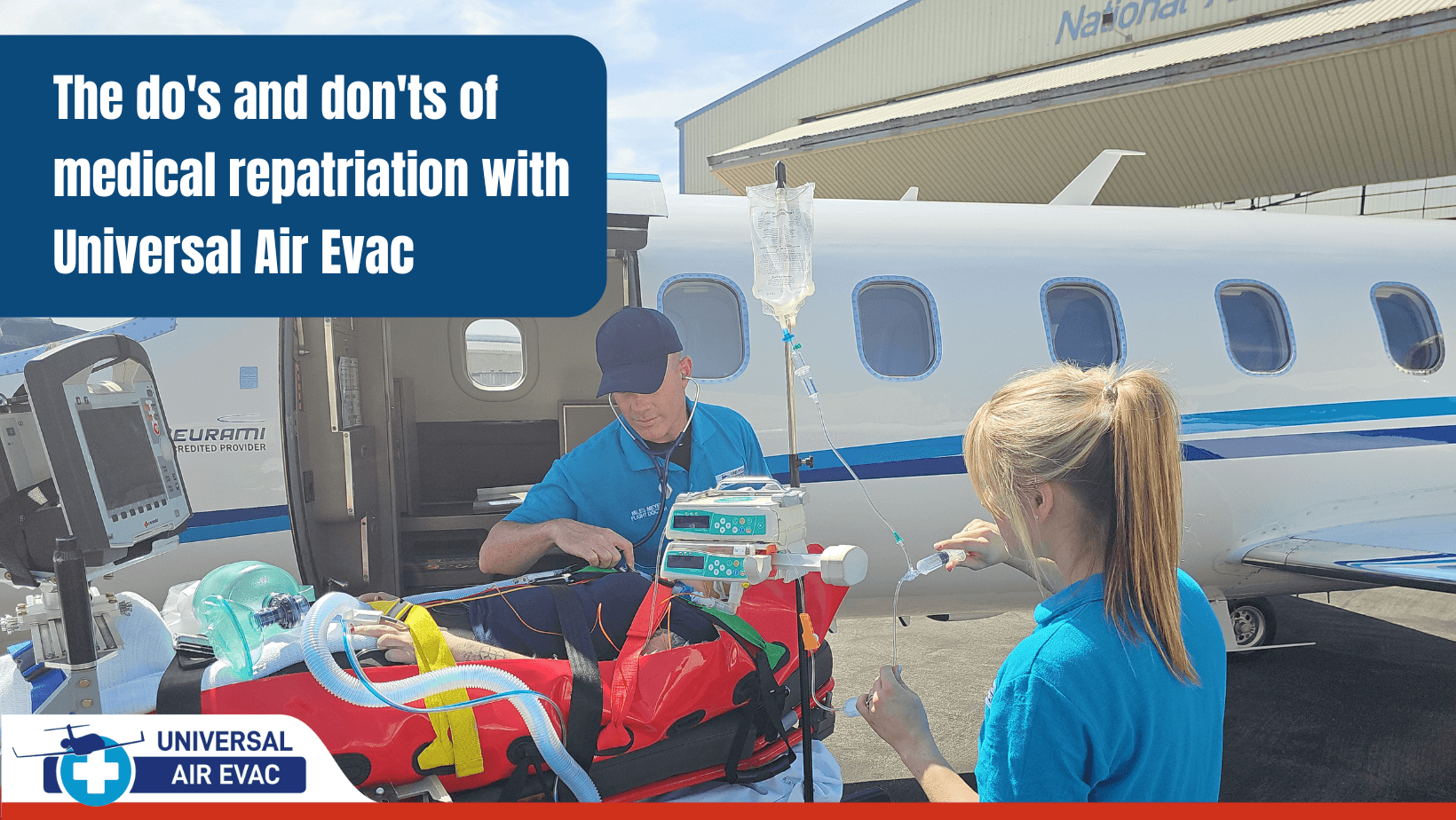The Do's and Don'ts of Medical Repatriation on an Air Ambulance

Medical repatriation on an air ambulance can be a stressful experience, but with Universal Air Evac, we strive to make the process as smooth and comfortable as possible. Whether you’re a patient or a loved one accompanying them, understanding the key do’s and don’ts can help ensure a seamless journey.
We have been asked what the do’s and don’t are of being transported back to your home country with Universal Air Evac. What are you allowed to bring? Can your partner fly back with you? What about your luggage? We thought we would take a closer look at just what you can do, what you can’t do and, importantly, what you can and cannot bring.
This is what you need to know:
The Do's
Let’s kick off with what you need to do and what you need to have ready (if you can) before getting onto an air ambulance. We understand that sometimes the patient might not be conscious, or in a position to prepare for this, but having them close to you for the flight is important.
Do Prepare Your Documents
- Medical Records: Before the flight, it is important to ensure all relevant medical records, prescriptions, and treatment plans are up-to-date and available when you travel internationally. Make sure that you have it all with you.
- Travel Documents: Have your passport, visas (if necessary), and any other identification in one place and on hand.
Do Pack Smart
- One Bag Rule: Due to space limitations, each passenger is allowed one small bag not exceeding 10kg. Pack essentials such as medications, personal hygiene items, and a change of clothes where they are easily accessible in flight.
- Pack warm clothes: Even when it is fairly hot outside, the cabin can be colder on some flights, especially longer ones.
Your Companion or Partner
- One Companion: Patients are usually allowed one companion to travel with them. This is, however, dependent on the flight itself and will be signed off by the crew. This person can provide emotional support and help with personal needs during the journey.
- Choose Wisely: Select a companion who is calm, supportive, and familiar with the patient’s needs. They will also be responsible for the patient's documents and luggage should the patient be unable to manage them themselves.
Do Follow Medical Instructions
- Doctor’s Orders: Adhere strictly to the crew’s instructions regarding medications and care during the flight.
- Communicate: Inform the medical crew about any changes in your condition or new symptoms immediately.
Do Communicate with the Air Evac Team
- Stay Informed: Keep open lines of communication with the Universal Air Evac team throughout the process.
- As mentioned, should anything change about your condition, it is important to communicate that with the team as soon as possible.
The Don'ts
Now that you know what to bring, and what is important to do, let’s take a look at what you should not be doing when you are repatriated with Universal Air Evac.
Don’t Overpack
- Limit to Essentials: Avoid bringing non-essential items due to limited space. Stick to the one-bag rule and prioritise crucial items.
- No Prohibited Items: Refrain from bringing any prohibited items as per aviation and medical regulations.
These include:
Sharp Objects
- Knives, including pocket knives and multi-tools.
- Scissors with blades longer than 4 inches.
- Box cutters and razor blades.
Firearms and Explosives
- Guns, firearms, and ammunition.
- Fireworks, flares, and other explosive materials.
- Stun guns, tasers.
Flammable Items
- Gasoline, lighter fluid.
- Aerosol sprays (except for medical purposes).
- Paint, thinners.
Chemical and Toxic Substances
- Bleach, chlorine, and other cleaning chemicals.
- Pepper spray, mace.
- Radioactive materials.
Tools
- Crowbars, hammers.
- Drills, saws, and other power tools.
- Tools with sharp edges or points longer than 7 inches.
Personal Defence Items
- Self-defence sprays.
- Martial arts weapons.
- Brass knuckles.
Don’t Ignore Medical Advice
- No Self-Medication: Do not self-medicate or change prescribed doses without consulting a healthcare professional.
- Stay Seated: Unless necessary, avoid moving around during the flight to ensure your safety and the safety of others, especially during a commercial escort flight.
Don’t Bring Extra Passengers
- One Companion Policy: Respect the one companion policy. Extra passengers cannot be accommodated due to space and safety considerations.
Don’t Hesitate to Ask for Help
- Assistance Available: If you need assistance or have concerns, do not hesitate to ask the medical crew or Universal Air Evac staff.
- Emergency Protocols: Familiarise yourself with emergency protocols and yourself with emergency protocols and follow the crew’s instructions promptly.
Don’t Forget Personal Comfort
- Dress Comfortably: Where possible, and especially during a Commercial Medical Escort flight, wear comfortable clothing suitable for a long flight.
- Stay Hydrated: Drink plenty of water to stay hydrated, but avoid excessive consumption of caffeinated or sugary drinks.
Conclusion
By following these do’s and don’ts, you can help ensure a safe and comfortable medical repatriation experience with Universal Air Evac. Our dedicated team is here to support you every step of the way, providing expert care and assistance. Remember, preparation and communication are key to a successful journey. Safe travels!
For more information, please contact Universal Air Evac.

